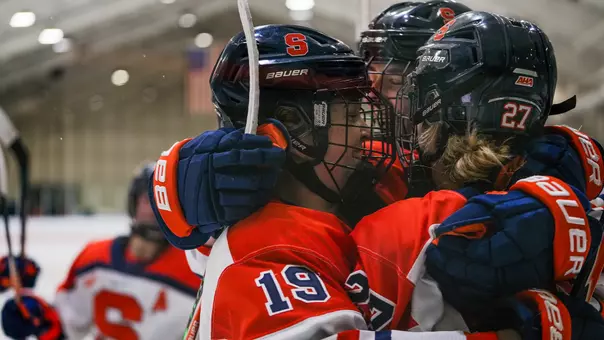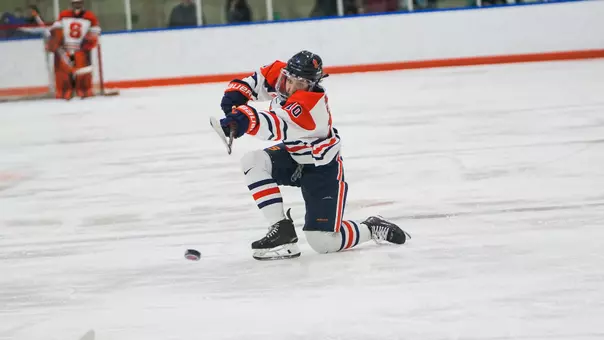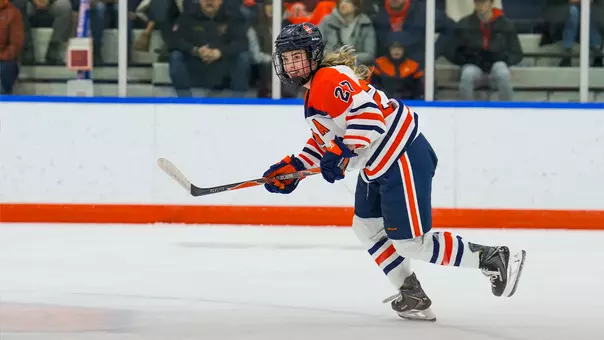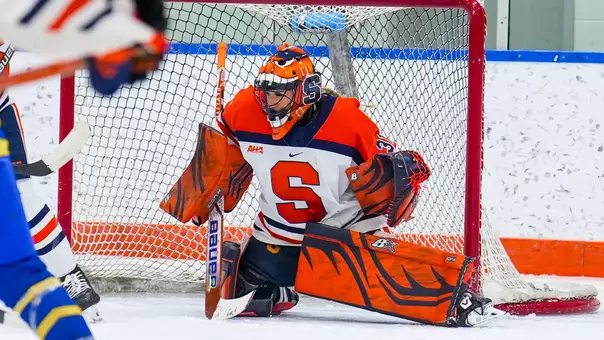Photo by: Michael J. Okoniewski
Lindsay Eastwood - Syracuse 8 Courage Award
5/4/2018 11:24:00 AM | Ice Hockey
"I'd been playing hockey since I was six years old and all of a sudden I wasn't going to be able to play ever again."
What would you do if you could never play the sport you loved most? The sport that you grew up around? The sport that had become your life? That was the reality that incoming freshman Lindsay Eastwood faced in August of 2015, just a few short weeks before she was set to begin her first semester at Syracuse University as a member of the women's ice hockey team.
Skating since she was two and playing league hockey since the age of six, Eastwood had dreams of representing Team Canada in the Olympics. The first step was playing provincial hockey for the Nepean Junior Wildcats, a team she captained during her junior and senior seasons. In 2013-14, Eastwood helped the team to the League Championship in addition to playing for the Canada U-18 team.
Ready for her first collegiate season at Syracuse, Eastwood received some devastating news just weeks before her departure for 'Cuse.
"Right before I was diagnosed I had a pain in my side," said Eastwood. "I thought it was a pulled muscle because, being an athlete, it felt like an injury, but it escalated. I saw four doctors and they finally diagnosed me with blood clots, which put a hold on hockey for a little bit."
Placed on blood thinners to help with the clotting, Eastwood was banned from sports that required physical contact, as a hit during intense sports like ice hockey could cause internal bleeding and potentially prove fatal. However, for Eastwood, it would hopefully be just a couple of months off the ice until they could find a solution.
Three months after getting diagnosed with blood clots, the doctors discovered that Eastwood had an autoimmune condition called lupus anticoagulant, a disorder that required a lifetime on blood thinners.
"It was really tough," said Eastwood, recalling the day she was diagnosed. "When the doctor told us that I was going to have to stay on blood thinners, it was devastating."
An athlete at heart, the Kanata native's first thought was which sport she could do instead. It had to be a non-contact sport due to the nature of the blood thinners, so Eastwood turned to rowing. After contacting the rowing coaches at Syracuse Eastwood began training with the team.
Still, the love and passion for the game of hockey was instilled in the Canadian, so she continued to get blood tests every three months to monitor the condition. The first blood test after being diagnosed came back with the same results, lupus anticoagulant. With just a five percent chance of reversal, Eastwood's hopes of one day playing hockey waned as the days continued to pass.
Then, a miracle happened. Eastwood was home for the summer and on her way out the door to play some pickup hockey with her friends, something she did once or twice a week, when her mom asked her to sit down.
"I go back to this day all the time," said Eastwood. "She sat me down and told me that my condition had reversed itself. I was in complete shock. There were instant tears and I was jumping up and down and running around."
The first thing the then sophomore did was call Syracuse ice hockey head coach Paul Flanagan to let him know the good news.
"All of a sudden, as quickly as it was taken away from her, she got her ability to come back and participate," said Flanagan.
Eastwood rejoined the team in the fall, this time as a redshirt freshman cleared for full participation. Not having played competitive hockey for over a year and a half, she had to put in hours of hard work to get back to the physical condition required of collegiate athletes. However, Eastwood did not take a minute for granted as she knew what life was like without hockey.
Come September 24, the Orange's first exhibition game of the season against the University of Montreal, Eastwood was ready to be on the ice with her teammates. It was a surreal moment for the redshirt freshman and her family as there was a point that they thought a collegiate hockey career would never be possible.
"My parents said that they shed a tear when they saw me skate on the ice because they didn't think that they'd ever see that again," recalled Eastwood. "The day that I got to play hockey again, that was the best day of my life."
Eastwood followed up her redshirt freshman campaign with an even better second year, leading all Orange defensemen in points (20) with three goals and 17 assists.
In her battle back from the autoimmune condition, Eastwood demonstrated uncommon bravery in the face of adversity, a quality that was honored this spring with the Syracuse 8 Courage Award. The honor is bestowed on an athlete that shows highly principled behavior and a commitment to sportsmanship and athletic achievement.
Recently elected captain for her redshirt junior season, Eastwood hopes to help the Orange to their first ever College Hockey America Title in the 2018-19 season. But, every once in a while, the Canadian will pause and reflect on her experiences and the outcome of the condition.
"I didn't realize that I was so strong," said Eastwood. "Hockey was my world but I realized that it's not everything and there is more to life than just hockey. Everyone really thought of me as Lindsay the hockey player but I came to realize that I am not just a hockey player; I am so much more."
What would you do if you could never play the sport you loved most? The sport that you grew up around? The sport that had become your life? That was the reality that incoming freshman Lindsay Eastwood faced in August of 2015, just a few short weeks before she was set to begin her first semester at Syracuse University as a member of the women's ice hockey team.
Skating since she was two and playing league hockey since the age of six, Eastwood had dreams of representing Team Canada in the Olympics. The first step was playing provincial hockey for the Nepean Junior Wildcats, a team she captained during her junior and senior seasons. In 2013-14, Eastwood helped the team to the League Championship in addition to playing for the Canada U-18 team.
Ready for her first collegiate season at Syracuse, Eastwood received some devastating news just weeks before her departure for 'Cuse.
"Right before I was diagnosed I had a pain in my side," said Eastwood. "I thought it was a pulled muscle because, being an athlete, it felt like an injury, but it escalated. I saw four doctors and they finally diagnosed me with blood clots, which put a hold on hockey for a little bit."
Placed on blood thinners to help with the clotting, Eastwood was banned from sports that required physical contact, as a hit during intense sports like ice hockey could cause internal bleeding and potentially prove fatal. However, for Eastwood, it would hopefully be just a couple of months off the ice until they could find a solution.
Three months after getting diagnosed with blood clots, the doctors discovered that Eastwood had an autoimmune condition called lupus anticoagulant, a disorder that required a lifetime on blood thinners.
"It was really tough," said Eastwood, recalling the day she was diagnosed. "When the doctor told us that I was going to have to stay on blood thinners, it was devastating."
An athlete at heart, the Kanata native's first thought was which sport she could do instead. It had to be a non-contact sport due to the nature of the blood thinners, so Eastwood turned to rowing. After contacting the rowing coaches at Syracuse Eastwood began training with the team.
Still, the love and passion for the game of hockey was instilled in the Canadian, so she continued to get blood tests every three months to monitor the condition. The first blood test after being diagnosed came back with the same results, lupus anticoagulant. With just a five percent chance of reversal, Eastwood's hopes of one day playing hockey waned as the days continued to pass.
Then, a miracle happened. Eastwood was home for the summer and on her way out the door to play some pickup hockey with her friends, something she did once or twice a week, when her mom asked her to sit down.
"I go back to this day all the time," said Eastwood. "She sat me down and told me that my condition had reversed itself. I was in complete shock. There were instant tears and I was jumping up and down and running around."
The first thing the then sophomore did was call Syracuse ice hockey head coach Paul Flanagan to let him know the good news.
"All of a sudden, as quickly as it was taken away from her, she got her ability to come back and participate," said Flanagan.
Eastwood rejoined the team in the fall, this time as a redshirt freshman cleared for full participation. Not having played competitive hockey for over a year and a half, she had to put in hours of hard work to get back to the physical condition required of collegiate athletes. However, Eastwood did not take a minute for granted as she knew what life was like without hockey.
Come September 24, the Orange's first exhibition game of the season against the University of Montreal, Eastwood was ready to be on the ice with her teammates. It was a surreal moment for the redshirt freshman and her family as there was a point that they thought a collegiate hockey career would never be possible.
"My parents said that they shed a tear when they saw me skate on the ice because they didn't think that they'd ever see that again," recalled Eastwood. "The day that I got to play hockey again, that was the best day of my life."
Eastwood followed up her redshirt freshman campaign with an even better second year, leading all Orange defensemen in points (20) with three goals and 17 assists.
In her battle back from the autoimmune condition, Eastwood demonstrated uncommon bravery in the face of adversity, a quality that was honored this spring with the Syracuse 8 Courage Award. The honor is bestowed on an athlete that shows highly principled behavior and a commitment to sportsmanship and athletic achievement.
Recently elected captain for her redshirt junior season, Eastwood hopes to help the Orange to their first ever College Hockey America Title in the 2018-19 season. But, every once in a while, the Canadian will pause and reflect on her experiences and the outcome of the condition.
"I didn't realize that I was so strong," said Eastwood. "Hockey was my world but I realized that it's not everything and there is more to life than just hockey. Everyone really thought of me as Lindsay the hockey player but I came to realize that I am not just a hockey player; I am so much more."
Syracuse Ice Hockey
Saturday, January 17
ICE: Syracuse vs. Delaware Highlights Game Two
Saturday, January 03
ICE: Syracuse vs. Delaware Highlights
Saturday, January 03
Highlights | Syracuse at RPI
Sunday, November 30
























